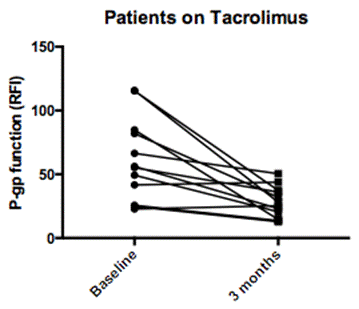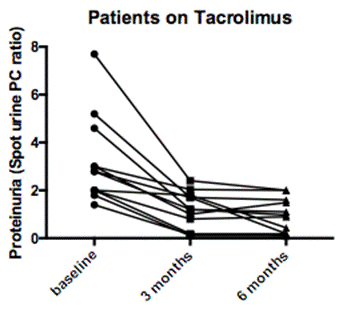Session Information
Date: Monday, November 6, 2017
Title: Systemic Lupus Erythematosus – Clinical Aspects and Treatment III: Biomarkers
Session Type: ACR Concurrent Abstract Session
Session Time: 4:30PM-6:00PM
Background/Purpose:
About 15-30% of Lupus Nephritis (LN) patients do not respond to first-line immunosuppressive therapy. P-glycoprotein (P-gp) mediated efflux of corticosteroids (CS) may contribute to the treatment unresponsiveness. Tacrolimus is a P-gp inhibitor and hence, may overcome this resistance. We, therefore, aimed to study the response to Tacrolimus, along with the expression and function of P-gp on peripheral blood lymphocytes (PBL) in patients with refractory and relapsing proliferative (ISN/RPS Class III/IV) Lupus Nephritis.
Methods:
We enrolled 12 refractory/relapsing LN patients (6 patients refractory to CYC based regimens and 6 patients with renal relapse) and treated them with CS + Tacrolimus (2-3 mg/day) for 6 months. Expression and function of P-gp on PBL was measured by flow cytometry (as relative fluorescence index, RFI) before and 3 months after Tacrolimus therapy. P-gp expression and function, before Tacrolimus therapy, was also compared with that in 16 LN patients who were naive to immunosuppressive drugs and CS (treatment-naive LN patients). Renal response was assessed according to ACR response criteria after 3 and 6 months of Tacrolimus therapy. Renal disease activity was measured by renal SLEDAI (rSLEDAI). The data (median and IQR) was analysed using non-parametric tests.
Results:
P-gp expression and function on PBL of refractory/relapsing LN patients before Tacrolimus therapy was significantly increased as compared to the treatment-naive LN patients (p < 0.01 and p < 0.001 respectively). 8 out of 12 refractory/relapsing LN patients achieved renal response (5 partial response, PR and 3 complete response, CR) as early as 3 months after start of Tacrolimus therapy, and 11 patients achieved renal response (7 PR and 4 CR) at 6 months from start of Tacrolimus therapy. Proteinuria decreased from median urine protein creatinine ratio (UPCR) of 2.80 (2.00-3.40) at baseline to 1.20 (0.66-1.73) at 3 months (p < 0.001) and to 0.80 (0.19-1.30) at 6 months (p < 0.01). Median rSLEDAI decreased from 8 (8-12) at baseline to 4 (3-5) at 3 months (p < 0.01) and to 4 (0-4) at 6 months (p < 0.01). There was significant decrease both in P-gp expression [RFI, 3.33 (2.87-4.97) vs 2.03 (1.25-3.86), p < 0.05) and P-gp function (RFI, 55.7 (29.7-84.1) vs 26.8 (16.1-37.0), p < 0.01) after 3 months of Tacrolimus therapy. None of the patients developed any adverse effects except one who developed rise in serum creatinine after 4 months of therapy.
Conclusion:
Tacrolimus achieves renal response in refractory/relapsing proliferative LN patients by overcoming P-glycoprotein mediated treatment unresponsiveness.
To cite this abstract in AMA style:
Gupta V, Edavalath S, Rai MK, Singh H, Chaturvedi S, Agarwal V. Tacrolimus Induces Remission in Refractory and Relapsing Lupus Nephritis By Decreasing P-Glycoprotein Expression and Function on Peripheral Blood Lymphocytes [abstract]. Arthritis Rheumatol. 2017; 69 (suppl 10). https://acrabstracts.org/abstract/tacrolimus-induces-remission-in-refractory-and-relapsing-lupus-nephritis-by-decreasing-p-glycoprotein-expression-and-function-on-peripheral-blood-lymphocytes/. Accessed .« Back to 2017 ACR/ARHP Annual Meeting
ACR Meeting Abstracts - https://acrabstracts.org/abstract/tacrolimus-induces-remission-in-refractory-and-relapsing-lupus-nephritis-by-decreasing-p-glycoprotein-expression-and-function-on-peripheral-blood-lymphocytes/


